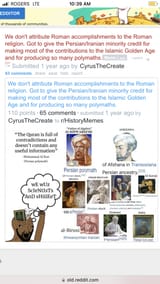Search Results
6/16/2025, 7:19:51 PM
More Ibn Khaldun on Arabs:
It is noteworthy how civilization always collapsed in places the Arabs took over and conquered, and how such settlements were depopulated and the (very) earth there turned into something that was no (longer) earth. The Yemen where (the Arabs) live is in ruins, except for a few cities. Persian civilization in the Arab 'Iraq is likewise completely ruined. The same applies to contemporary Syria. When the Banu Hilal and the Banu Sulaym pushed through (from their homeland) to Ifrigiyah and the Maghrib in (the beginning of) the fifth [eleventh] century and struggled there for three hundred and fifty years, they attached themselves to (the country), and the flat territory in (the Maghrib) was completely ruined. formerly, the whole region between the Sudan and the Mediterranean had been settled. This (fact) is attested by the relics of civilization there, such as monuments, architectural sculpture, and the visible remains of villages and hamlets. Furthermore, as we have stated before,147 it is the nature of (the Arabs) not only to appropriate the possessions of other people but, beyond that, to refrain from exercising any (power of) arbitration among them and to fail to keep them from (fighting) each other.
So, there seems to be something of a narrative there (seemingly contemporary to Ibn Khaldun), that "ethnic Arabs" simply absorbed, conquered and never created sustainable civilization whereas Persians and other Muslims were the ones really spearheading achievement. I'm just wondering if there is any truth to that (clearly biased) narrative.
So why do they call it the Islamic golden age?
It is noteworthy how civilization always collapsed in places the Arabs took over and conquered, and how such settlements were depopulated and the (very) earth there turned into something that was no (longer) earth. The Yemen where (the Arabs) live is in ruins, except for a few cities. Persian civilization in the Arab 'Iraq is likewise completely ruined. The same applies to contemporary Syria. When the Banu Hilal and the Banu Sulaym pushed through (from their homeland) to Ifrigiyah and the Maghrib in (the beginning of) the fifth [eleventh] century and struggled there for three hundred and fifty years, they attached themselves to (the country), and the flat territory in (the Maghrib) was completely ruined. formerly, the whole region between the Sudan and the Mediterranean had been settled. This (fact) is attested by the relics of civilization there, such as monuments, architectural sculpture, and the visible remains of villages and hamlets. Furthermore, as we have stated before,147 it is the nature of (the Arabs) not only to appropriate the possessions of other people but, beyond that, to refrain from exercising any (power of) arbitration among them and to fail to keep them from (fighting) each other.
So, there seems to be something of a narrative there (seemingly contemporary to Ibn Khaldun), that "ethnic Arabs" simply absorbed, conquered and never created sustainable civilization whereas Persians and other Muslims were the ones really spearheading achievement. I'm just wondering if there is any truth to that (clearly biased) narrative.
So why do they call it the Islamic golden age?
Page 1
